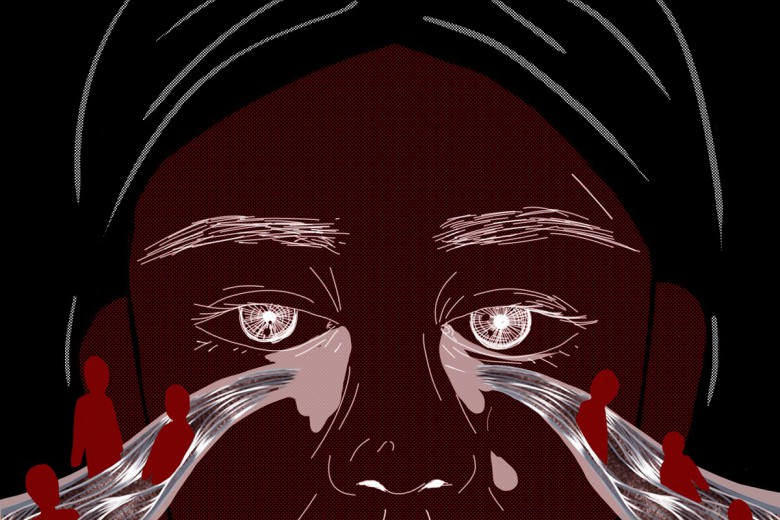Unrepentant
Kevin Annett and Canada’s Genocide
Produced by Kevin Annett, Louie Lawless and Lori O’Rorke, 2006
_“Their reason for killing and destroying such an infinite number of souls is that the Christians have an ultimate aim, which is to acquire gold, and to swell themselves with riches in a very brief time and thus rise to a high estate, disproportionate to their merits. It should be kept in mind that their insatiable greed and ambition, the greatest ever seen in the world, is the cause of their villainies.” _
-Bishop Bartolomé de Las Casas, from Brief Account of the Devastation of the Indies, 1542.
When Kevin Annett accepted the position of Minister at St. Andrews United Church in Port Alberni, BC, in 1992, he was a little naïve. After leading his first service he asked a colleague why no First Nations people attended the church, considering that over one-third of the city’s population was First Nations. Unsatisfied with the answer he received, Annett began a journey of discovery that would get him fired and physically assaulted, and destroy his reputation and marriage, but would produce a film that is of monumental importance to our country’s efforts to come to terms with its own history.
Unrepentant: Kevin Annett and Canada’s Genocide is a 106-minute documentary that chronicles the deliberate genocide of Canada’s Indigenous people, from early colonization and the first use of biological warfare, to church-run residential schools, to the ongoing theft of resource-rich Native land. Solid historical information and first-hand testimonies of residential school survivors are interwoven with Annett’s own story to create a powerful and educational film.
Unrepentant is based on Kevin Annett’s self-published 2001 book Hidden from History: The Canadian Holocaust, an important and moving work in its own right. The Unrepentant project was a completely self-funded, grassroots effort, and the low budget is evident in the production quality of the film. Unlike other recent political documentaries, Unrepentant is not witty, cute, or campy. It has no ironic music, clever editing or technical wizardry, just a straightforward, stark, and often disturbing account of a people who survived over four hundred years of ethnic cleansing, and of a man willing to sacrifice everything to help tell their story.
It may be difficult for many non-Native Canadians to come to grips with the information presented in Unrepentant, as it has been long suppressed and denied. Beatings, electric shocks, forced sterilization, medical experimentation, starvation, rape, and the deaths and disappearance of more than 50,000 First Nations children in residential schools—Annett’s film exposes the depth of Canada’s savagery towards Aboriginal people.
Unrepentant draws on personal testimony and eyewitness accounts to bring this history to life, while drawing upon Annett’s own experiences to demonstrate the systematic denial of the historic and ongoing violation of Aboriginal people. “I witnessed the murder of Maisie Shaw,” testified Harriet Nahanee, Native Elder of the Pacheedaht Nation (1935-2007). In December 1946, Alfred Caldwell, then Principal of the Alberni Residential School, kicked fourteen-year-old Maisie Shaw down a flight of stairs to her death. Annett reported the Maisie Shaw murder the day he learned about it, in December 1995, but encountered a familiar resistance when requesting an investigation. “They had the same response to any of the deaths I reported, year after year. Complete refusal,” he says.
But Kevin Annett wasn’t fired for helping to expose the murders of First Nations people. Instead, it was his exposure of the colonial lust for land and resources, which continues to define our society’s relationship to its Aboriginal people, that provoked such severe censure. As Annett states, “The Achilles heel here is the issue of the land.”
In the course of my work with residential school survivors while I was still a Minister in Port Alberni,” he explains, “I stumbled over the fact that the church had engaged in the theft and speculation of Aboriginal land in Ahousat, B.C., in order to profit its corporate benefactor, the logging company MacMillan-Bloedel.” In October 1994, Annett wrote a letter to church officials expressing concern about the issue of stolen Native land. “A week later,” he says, “Presbytery officials began meeting secretly with my church board to arrange my removal as Minister at St. Andrew’s.”
“_Unrepentant_ is many things, but for me it is a mirror, held up to my own Euro-Canadian culture and people,” he states. For Annett, our antipathy towards the original people of this land represents a deep and abiding disrespect of life itself. “I am counseling and speaking to the dying in this film: to the members of a collapsing culture whose ways are causing their own planetary self-destruction in the wake of their extermination of millions of Indigenous people.”
With the film recently garnering a Best Director Award at the 2006 New York Independent Film and Video Festival, and winning the award for Best International Documentary at the 2006 Los Angeles Independent Film Festival, Annett’s efforts are finally being recognized.
Unrepentant can be ordered from www.hiddenfromhistory.org, or viewed online at video.google.ca.



_780_520_90_s_c1.jpg)


